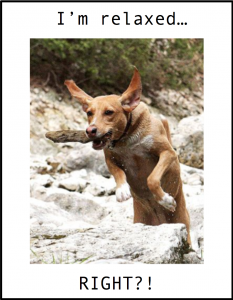Behavioral interviewing tip #8: Relax
Previous posts in series:
- Behavioral interviewing tip #1: Use results to demonstrate past successes
- Behavioral interviewing tip #2: Prepare stories from your career based on the job description for the position you want
- Behavioral interviewing tip #3: Research the company and its industry and products
- Behavioral interviewing tip #4: Give STAR responses
- Behavioral interviewing tip #5: Answer “negative” questions positively and with an appropriate level of candor
- Behavioral interviewing tip #6: Be succinct
- Behavioral interviewing tip #7: Don’t try to game the system (because it’s essentially impossible)
 As with any type of interview, relaxing is to your advantage in the behavioral interview. Aside from the better impression you’ll make if you’re relaxed, you’ll be able to remember more details and answer the questions more fluidly.
As with any type of interview, relaxing is to your advantage in the behavioral interview. Aside from the better impression you’ll make if you’re relaxed, you’ll be able to remember more details and answer the questions more fluidly.
The good news is that there are several reasons why you may find a behavioral interview more inherently relaxing than a old-school interview:
- Instead of vague questions of dubious meaning (“What is your greatest weakness?”), behavioral interview questions are about performance and results. If you are ready to talk concretely about your past successes, preferably with quantifiable results, then you will be fine. There are no tricks or trip-ups.
- Behavioral interviewing is often conducted over the phone. We at Key Corporate Services do many behavioral interviews over the phone for our clients. Often the first interview is a behavioral phone interview, and the second interview is conducted in person to review demeanor, personal and presentation skills, etc. In a phone interview, of course, you don’t have to worry about how you look, so it can be more comfortable for a lot of people.
- In a behavioral interview, you are being scored, not judged. A good interviewer using the proper methodology will be focused on scoring your answers and not trying to “read” you.
On the other hand, certain people may find the behavioral interview to be less comfortable than an old-school interview. People who are used to cruising through interviews solely on social skills and clever answers to fluff questions may find the behavioral approach tougher.
At the end of the day, it comes down to outlook and preparedness. If you go into the behavioral interview with a good grip on your past accomplishments, you should be able to relax and do fine. Just keep in mind that there are no tricks–it all comes down to the facts of your career.
Matt
The Key Corporate Services Blog Team
